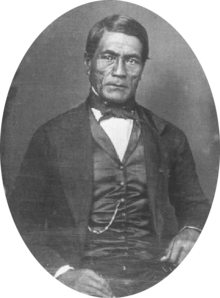John Papa ʻĪʻī
| John Papa ʻĪʻī | |
|---|---|
 |
|
| Born |
August 3, 1800 Kūmelewai, Waipiʻo, Oʻahu |
| Died | May 2, 1870 (aged 69) Mililani, Honolulu, Oʻahu |
| Nationality | Kingdom of Hawaii |
| Spouse(s) | Sarai Hiwauli Kamaka Maleka Kaʻapā Maraea Kamaunauikea Kapuahi |
| Children | Irene Haʻaloʻu Kahalelauko-a-Kamāmalu ʻĪʻī Brown |
John (Ioane) Kaneiakama Papa ʻĪʻī (1800–1870) was a 19th-century educator, politician and historian in the Kingdom of Hawaii.
ʻĪʻī was born 1800, in the month of Hilinehu, which he calculated to be August 3, in later life. He was born near the Hanaloa fishpond in Kūmelewai, Waipiʻo, ʻEwa, Oʻahu. His mother was Kalaikāne Wanaoʻa Pahulemu while he is considered to have two fathers, a tradition called poʻolua, either Kuaʻena Mālamaʻekeʻeke or Kaiwikokoʻole, although ʻĪʻī claimed as the former as his father because he did not resemble Kaiwikokoʻole. His family belonged to the Luluka branch of the Luahine line, hereditary kahu (caretaker) to the chiefs of Hawaii. His older brother was Daniel Papa ʻĪʻī. ʻĪʻī was raised under the traditional kapu system and trained from childhood for a life of service to the high chiefs. At the age of ten he was taken to Honolulu by his uncle Papa ʻĪʻī, a kahu of Kamehameha I, to become a companion and personal attendant to Prince Liholiho, who became King Kamehameha II in 1819. ʻĪʻī was close to Liholiho during the young heir's instruction in the conduct of government and ancient religious rites. His master died in 1823 in England.
After Liholiho's death, ʻĪʻī continued to serve the rulers of Hawai‘i and including being kahu for Victoria Kamāmalu and hānai father of Mary Polly Paʻaʻāina. ʻĪʻī and his wife Sarai Hiwauli were selected to be kahu of the students at the Chiefs' Children's School in 1840. Throughout his life he was in constant contact with the political, religious, and social concerns of the court, as well as the common people. ʻĪʻī was among the first Hawaiians to study reading and writing with the missionaries, yet although he adopted Christian teachings, he retained a profound love and respect for the culture of his ancestors.
ʻĪʻī served as a general superintendent of Oʻahu schools and was an influential member in the court of Kamehameha III. In 1842, he was appointed by the king to the Treasury Board. He served as a member of the Privy Council 1845–1859 and in 1846 was appointed to the Board of Land Commissioners. ʻĪʻī served in the House of Nobles from 1841 to 1870. In 1852, he represented the House of Nobles in the drafting of the Constitution and became the Speaker of the House of Nobles. He served as a member of the House of Representatives during the session of 1855. He served from 1848 as a superior court judge, and from 1852 to 1864 as an associate justice of the Supreme Court of the Kingdom. ʻĪʻī died of scarlet fever on May 2, 1870 at Mililani, his residence in Honolulu.
...
Wikipedia
